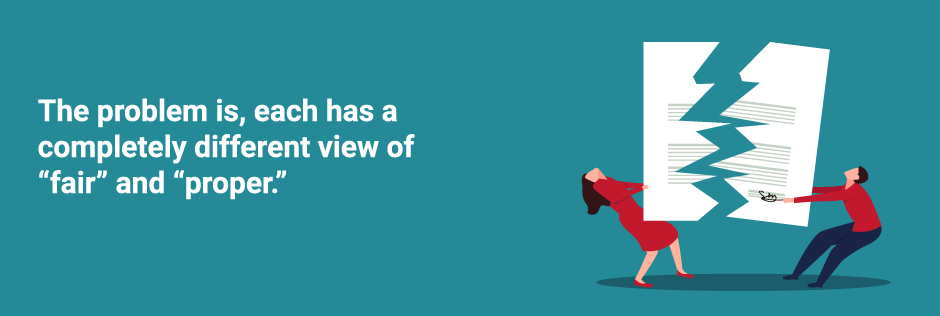Divorce cases are unlike virtually all other civil litigation. For one thing, they are extremely emotionally charged. Further, they require a working knowledge of such a wide variety of different areas of the law. Also, judges have much broader discretion in family law cases than they do in most other areas of the law.

Problems with Splitting Assets
Another major distinction between divorce cases and most other areas of litigation is that there is virtually never a clear-cut “winner” or “loser” in a divorce case. Both divorcing parties are usually asking for the same thing – a “fair” division of the assets and debts, and a “proper” decision that is in the best interest of the children.
The problem is, each has a completely different view of “fair” and “proper.” Because judges have such broad discretion in family law cases and because each judge brings his or her own set of values to the bench, the results in a divorce case are frequently unpredictable in virtually identical cases.

Judges Playing Solomon
Additionally, judges have a tendency to “play Solomon” in divorce cases. They try to be fair by splitting things down the middle i.e., to give both parties some, but not all, of what they want. For example, a husband will say that his business (which he will want to receive in the decree) is worth only $10,000. Wife’s expert will swear it is worth $50,000, and the judge will determine it is worth $25,000, which pleases neither party. Unfortunately, this is often the rule rather than the exception in divorce cases.

Each spouse, convinced that his or her points of view are the only “fair” and “proper” views, feel that they need to somehow be vindicated for all of the pain and hurt they have gone through. They set up false expectations. They expect courts to solve their financial and other problems. In reality, courts cannot usually solve a party’s problems; all a court can do is to divide up what presently exists and grant a divorce.
Because of all of the above, it has become an unfortunate but an often-stated saying among divorce attorneys that if the court enters an order which is not satisfactory to either party, then it is probably a fair decision.
How to Know What a Judge Will Decide
Also, because of the above, it is very difficult for any attorney to predict with any degree of certainty exactly what a judge will do in a particular case. All attorneys have won some cases that they should have lost and lost some that they thought they should have won. Although an attorney can generally give a broad ballpark idea of what a judge will probably do (if everything falls into place), there is no way for any lawyer to guarantee what a judge is going to do on a given case. This is one of the reasons why so many cases settle.

How to Know Who Wins
Finally, it is very difficult for any party to come out of a divorce feeling as if he or she is the “winner,” no matter what the result is. Sometimes this is because of false expectations, but often it is because there is no way for either party to be a “winner” or “loser” in the overall scheme of things.

Contact a Divorce Attorney Today

